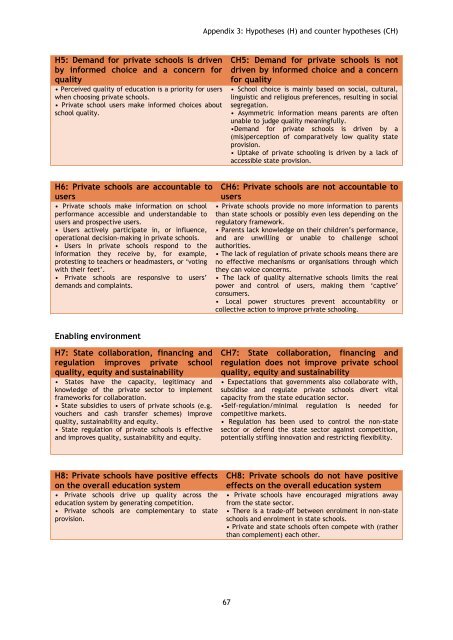private-schools-full-report
private-schools-full-report
private-schools-full-report
Create successful ePaper yourself
Turn your PDF publications into a flip-book with our unique Google optimized e-Paper software.
Appendix 3: Hypotheses (H) and counter hypotheses (CH)<br />
H5: Demand for <strong>private</strong> <strong>schools</strong> is driven<br />
by informed choice and a concern for<br />
quality<br />
• Perceived quality of education is a priority for users<br />
when choosing <strong>private</strong> <strong>schools</strong>.<br />
• Private school users make informed choices about<br />
school quality.<br />
CH5: Demand for <strong>private</strong> <strong>schools</strong> is not<br />
driven by informed choice and a concern<br />
for quality<br />
• School choice is mainly based on social, cultural,<br />
linguistic and religious preferences, resulting in social<br />
segregation.<br />
• Asymmetric information means parents are often<br />
unable to judge quality meaning<strong>full</strong>y.<br />
•Demand for <strong>private</strong> <strong>schools</strong> is driven by a<br />
(mis)perception of comparatively low quality state<br />
provision.<br />
• Uptake of <strong>private</strong> schooling is driven by a lack of<br />
accessible state provision.<br />
H6: Private <strong>schools</strong> are accountable to<br />
users<br />
• Private <strong>schools</strong> make information on school<br />
performance accessible and understandable to<br />
users and prospective users.<br />
• Users actively participate in, or influence,<br />
operational decision-making in <strong>private</strong> <strong>schools</strong>.<br />
• Users in <strong>private</strong> <strong>schools</strong> respond to the<br />
information they receive by, for example,<br />
protesting to teachers or headmasters, or ‘voting<br />
with their feet’.<br />
• Private <strong>schools</strong> are responsive to users’<br />
demands and complaints.<br />
CH6: Private <strong>schools</strong> are not accountable to<br />
users<br />
• Private <strong>schools</strong> provide no more information to parents<br />
than state <strong>schools</strong> or possibly even less depending on the<br />
regulatory framework.<br />
• Parents lack knowledge on their children’s performance,<br />
and are unwilling or unable to challenge school<br />
authorities.<br />
• The lack of regulation of <strong>private</strong> <strong>schools</strong> means there are<br />
no effective mechanisms or organisations through which<br />
they can voice concerns.<br />
• The lack of quality alternative <strong>schools</strong> limits the real<br />
power and control of users, making them ‘captive’<br />
consumers.<br />
• Local power structures prevent accountability or<br />
collective action to improve <strong>private</strong> schooling.<br />
Enabling environment<br />
H7: State collaboration, financing and<br />
regulation improves <strong>private</strong> school<br />
quality, equity and sustainability<br />
• States have the capacity, legitimacy and<br />
knowledge of the <strong>private</strong> sector to implement<br />
frameworks for collaboration.<br />
• State subsidies to users of <strong>private</strong> <strong>schools</strong> (e.g.<br />
vouchers and cash transfer schemes) improve<br />
quality, sustainability and equity.<br />
• State regulation of <strong>private</strong> <strong>schools</strong> is effective<br />
and improves quality, sustainability and equity.<br />
CH7: State collaboration, financing and<br />
regulation does not improve <strong>private</strong> school<br />
quality, equity and sustainability<br />
• Expectations that governments also collaborate with,<br />
subsidise and regulate <strong>private</strong> <strong>schools</strong> divert vital<br />
capacity from the state education sector.<br />
•Self-regulation/minimal regulation is needed for<br />
competitive markets.<br />
• Regulation has been used to control the non-state<br />
sector or defend the state sector against competition,<br />
potentially stifling innovation and restricting flexibility.<br />
H8: Private <strong>schools</strong> have positive effects<br />
on the overall education system<br />
• Private <strong>schools</strong> drive up quality across the<br />
education system by generating competition.<br />
• Private <strong>schools</strong> are complementary to state<br />
provision.<br />
CH8: Private <strong>schools</strong> do not have positive<br />
effects on the overall education system<br />
• Private <strong>schools</strong> have encouraged migrations away<br />
from the state sector.<br />
• There is a trade-off between enrolment in non-state<br />
<strong>schools</strong> and enrolment in state <strong>schools</strong>.<br />
• Private and state <strong>schools</strong> often compete with (rather<br />
than complement) each other.<br />
67


